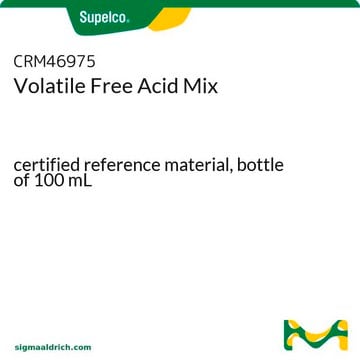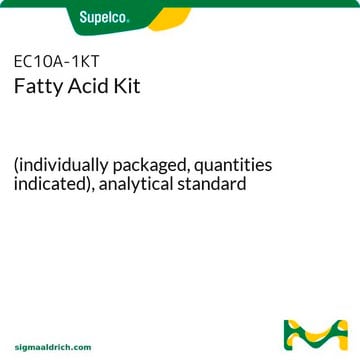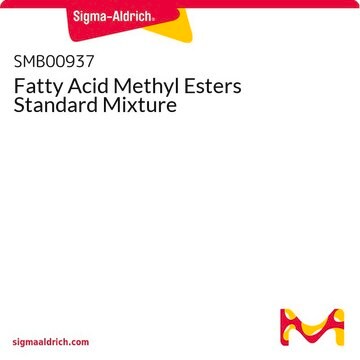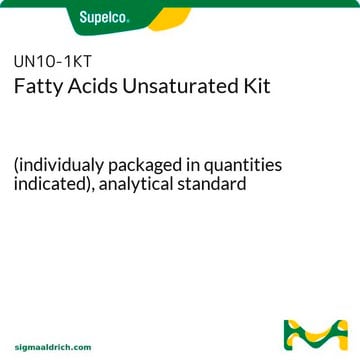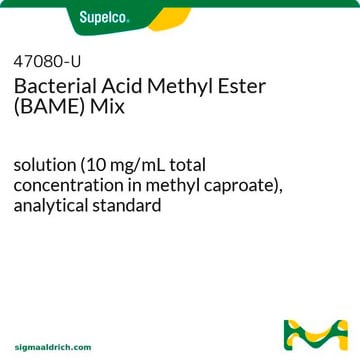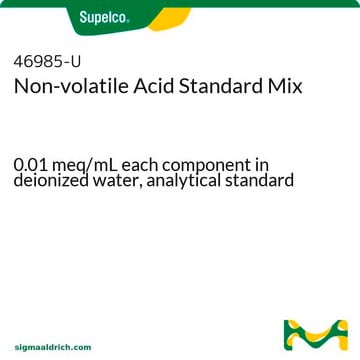SBR00030
Short Chain Fatty Acid Kit
0.2μM filtered
Synonym(s):
Sodium acetate, Sodium propionate, and Sodium butyrate
Sign Into View Organizational & Contract Pricing
All Photos(3)
About This Item
UNSPSC Code:
12352211
NACRES:
NA.25
Recommended Products
Related Categories
General description
Short chain fatty acids (SCFAs) are saturated fatty acids with less than 6 carbons. SCFAs are produced in the gut by microbial fermentation of dietary fibers.(1) The most important and researched SCFAs are Acetate (Ac), propionate (Pr) and butyrate (Bu).(2) SCFAs are predominantly found in the colon and cross the intestinal epithelium to the blood stream. SCFAs were found to be beneficial and effective in prevention of obesity, Non-alcoholic fatty liver disease and insulin resistance.(3,4)
Application
SCFAs can serve in various applications including in vitro and in vivo administration to study the effect on immune system activation(5), protect epithelial cells from LPS penetration by tight junction formation induction(6), effect insulin secretion(7) and more. In these studies, SCFAs were administrated in vitro at the following concentration range Acetate 1-10mM, propionate and butyrate 0.1-1mM and in vivo Acetate, 70 mM; propionate, 30 mM; butyrate, 20 mM.
Short-chain fatty acids (SCFAs) have diverse roles in various metabolic processes, and their measurement through metabolomics can provide valuable insights into several applications.
Biochem/physiol Actions
Role
- Regulate metabolism in the gut
- Indicators of gut health and inflammation
- Associated with gastrointestinal diseases such as IBS and other conditions such as obesity, colonic carcinogenesis, insulin sensitivity and ischemic stroke
Features and Benefits
- High-quality chemical, suitable for mulitple research applications
- Commonly employed in Metabolomics and Biochemical studies
Other Notes
For additional information on our range of Biochemicals, please complete this form.
Storage Class Code
10 - Combustible liquids
Certificates of Analysis (COA)
Search for Certificates of Analysis (COA) by entering the products Lot/Batch Number. Lot and Batch Numbers can be found on a product’s label following the words ‘Lot’ or ‘Batch’.
Already Own This Product?
Find documentation for the products that you have recently purchased in the Document Library.
Hui Yan et al.
PloS one, 12(6), e0179586-e0179586 (2017-06-28)
The intestinal epithelial barrier, composed of epithelial cells, tight junction proteins and intestinal secretions, prevents passage of luminal substances and antigens through the paracellular space. Dysfunction of the intestinal barrier integrity induced by toxins and pathogens is associated with a
Myunghoo Kim et al.
Cell host & microbe, 20(2), 202-214 (2016-08-02)
Antibody production is a metabolically demanding process that is regulated by gut microbiota, but the microbial products supporting B cell responses remain incompletely identified. We report that short-chain fatty acids (SCFAs), produced by gut microbiota as fermentation products of dietary
Ara Koh et al.
Cell, 165(6), 1332-1345 (2016-06-04)
A compelling set of links between the composition of the gut microbiota, the host diet, and host physiology has emerged. Do these links reflect cause-and-effect relationships, and what might be their mechanistic basis? A growing body of work implicates microbially
J H Cummings et al.
Gut, 28(10), 1221-1227 (1987-10-01)
Evidence for the occurrence of microbial breakdown of carbohydrate in the human colon has been sought by measuring short chain fatty acid (SCFA) concentrations in the contents of all regions of the large intestine and in portal, hepatic and peripheral
Emanuel E Canfora et al.
Nature reviews. Endocrinology, 15(5), 261-273 (2019-01-24)
Evidence is accumulating that the gut microbiome is involved in the aetiology of obesity and obesity-related complications such as nonalcoholic fatty liver disease (NAFLD), insulin resistance and type 2 diabetes mellitus (T2DM). The gut microbiota is able to ferment indigestible
Our team of scientists has experience in all areas of research including Life Science, Material Science, Chemical Synthesis, Chromatography, Analytical and many others.
Contact Technical Service